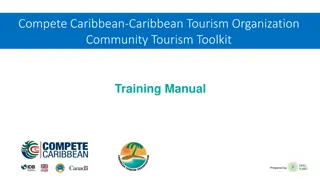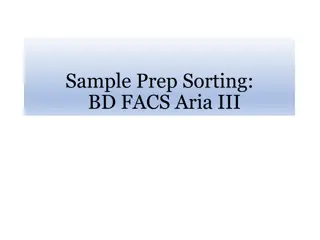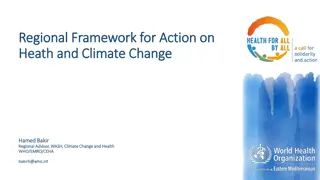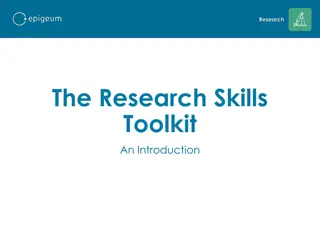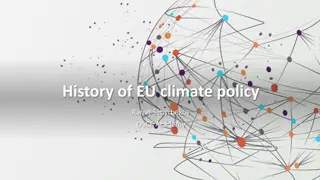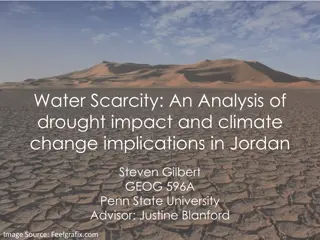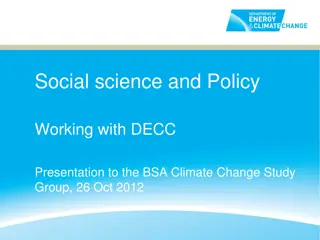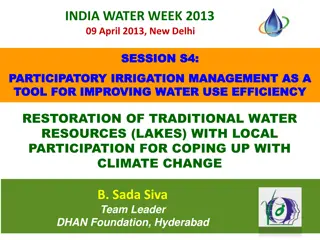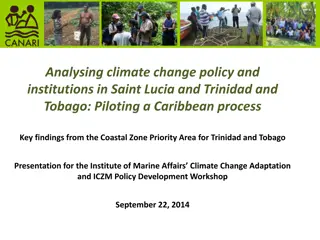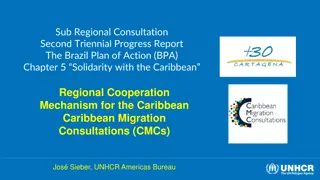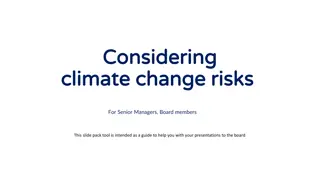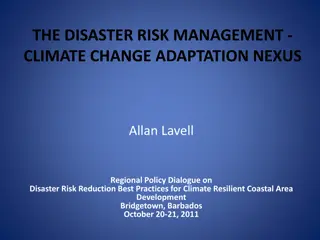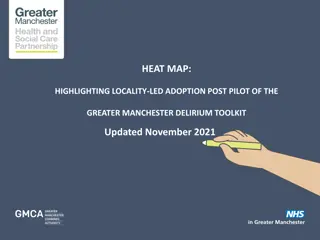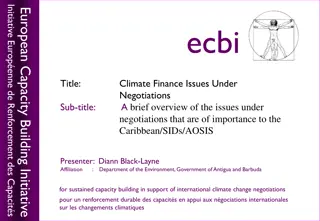Enhancing Climate Change Policy in the Caribbean through Participatory Research: ARIA Toolkit Pilot
Strong efforts are being made to enhance climate change policy and institutions in the Caribbean through a participatory research project. Funded by CDKN, the project aims to improve the capacity of Caribbean islands to develop and implement effective climate change adaptation policies. The ARIA toolkit is being used to pilot a rigorous and participatory research process in Saint Lucia and Trinidad and Tobago, focusing on understanding effective adaptation policies and actions. The project involves assessing current policies, institutions, and actions related to climate change adaptation at the national level, with a focus on readiness in key functional areas.
Download Presentation

Please find below an Image/Link to download the presentation.
The content on the website is provided AS IS for your information and personal use only. It may not be sold, licensed, or shared on other websites without obtaining consent from the author. Download presentation by click this link. If you encounter any issues during the download, it is possible that the publisher has removed the file from their server.
E N D
Presentation Transcript
Participatory research to enhance climate change policy and institutions in the Caribbean: ARIA toolkit pilot 26thmeeting of the CANARI Partnership August 21 22, 2014 Trinidad and Tobago
Introduction Strongest efforts for planning and action for climate change adaptation have taken place at the international and, to a more limited extent, at the community level For climate change adaptation actions to have their greatest effect, there needs to be a focus on the national and sectoral levels, where institutional and legal frameworks shape the quality of decisions at all levels and the processes must be transparent, accountable and inclusive Because it has been internationally driven and at the national level, government led, civil society tends to lack ownership for adaptation policy and action
Introduction contd 1 year project: January 2013(got started March/April) Funded by the Climate and Development Knowledge Network (CDKN): US$90,000 Implementation partners: Caribbean Natural Resources Institute (CANARI) lead regional NGO World Resources Institute (WRI) - international capacity building and comparative research, ARIA tool Saint Lucia National Trust - lead NGO in Saint Lucia. Pilot countries: Saint Lucia and Trinidad and Tobago
Objectives Goal: to improve the capacity of Caribbean islands to develop and implement effective climate change adaptation policy and action. Overall objective: to pilot a rigorous and participatory research process in Saint Lucia and Trinidad and Tobago that builds understanding of effective climate change adaptation policy, institutions and actions, and improves capacity for participatory climate change policy design and adaptation implementation in Caribbean SIDS. Specific Objectives, such as: facilitate and support participatory research by civil society on climate change adaptation policy, institutions and actions analyse the current state of policy, institutions and actions identify high-priority and low-cost next steps develop island-specific approaches to vulnerability assessment
ARIA toolkit Two phase approach: Phase I: assessment of change adaptation at the national level the current policy, institutions and actions for climate 5 main functional areas that would enable climate change adaptation readiness: assessment, prioritisation, coordination, mainstreaming information management, and The outputs generated from Phase I provide the foundation for Phase II in which key priority sectors are identified for further research and analysis. Phase II: assessment of the current policy, institutions and actions for climate change adaptation in three priority areas
ARIA toolkit contd The outputs from Phase II provide information and guidance to key stakeholders within these sectors on the main issues that need to be addressed through appropriate reforms in laws, institutions and practices.
Results Trinidad and Tobago ARIA Phase I: Assessment: Few assessments have been conducted on climate change. Existing assessments tended to be project based. No inventory of climate change projects existed. Prioritisation: There was no apparent process to set national priorities for climate change adaptation. Coordination: Coordination for climate change adaptation at the national level did not exist, although the Office of Disaster Preparedness and Management (ODPM) had recently been mandated with this responsibility. The ODPM was still in the process of incorporating this new mandate into its normal procedures.
Results contd ARIA Phase I cont d: Information Management: Information regarding climate change was collected by various agencies but was not always publicly available. There was no national platform for information sharing . Mainstreaming: The Integrated Coastal Zone Management (ICZM) component of an IDB loan for a climate change adaptation project would provide the opportunity to mainstream climate change adaptation into national policies, programmes and projects. APRIA Phase II [coastal zone, food production and tourism] In general, research findings indicate that there are significant gaps at the national institutional level for each of the identified sectors with respect to climate adaptation readiness.
Results contd APRIA Phase II cont d Assessment: There are limited national vulnerability and impact assessments for the food production and coastal zone management sectors to guide strategic adaptation interventions, while none appear to exist for the tourism sector. Prioritisation: There is little prioritisation of climate adaptation strategies at the national level for the identified sectors, most notably in the food production and tourism sectors. Work under the ICZM committee represent the most significant efforts at climate adaptation related to the coastal zone. Coordination: National climate change adaptation efforts are not being effectively coordinated among government, civil society and academia. The EMA is currently in the implementation phase of an IDB project coordinating role in mainstreaming climate change related priorities into all development sectors. to improve its
Results contd APRIA Phase II cont d Information management: While some information may exist from various sources (e.g. Trinidad and Tobago Meteorological Service), there is no single platform that consolidates this information for easy distribution to interested stakeholders. into national and sectoral developmental planning. Mainstreaming: Efforts are underway by the EMA to mainstream climate change
Results contd Saint Lucia: ARIA Phase I: [PPCR: Pilot Program of Climate Resilience] Assessment: Initial National Communication to the UNFCCC examined the coastal zone and fisheries sector, forestry and terrestrial resources, freshwater resources, human settlements, human health and services, agricultural sector and tourism sector, with the Second National Communication (SNC) looking at the agriculture and food sector, coastal sector, critical infrastructure, disaster, financial services, forest and marine biodiversity, health, human settlements and population distribution, tourism and water. Prioritisation: There is a process for identification of priority sectors, based on socio-economic factors that are important for national development, which was obtained through national consultation with relevant stakeholders.
Results contd Saint Lucia: ARIA Phase I cont d: Coordination: The National Climate Change Committee is responsible for coordinating climate change strategies. The Sustainable Development and Environment Division (SDED), Ministry of Sustainable Development, Energy, Science and Technology would also appear to have a role in coordinating climate change adaptation actions. However, there would appear to be little coordination for climate change adaptation at the national level. Information Management: Data gathering systems are generally well maintained e.g. the meteorological and hydrological stations of the Water Resources Management Agency (WRMA) and the Saint Lucia Meteorological Service (SLMS). Data is usually available as processed data and can be obtained on request by members of the public.
Results Saint Lucia: ARIA Phase I cont d: Mainstreaming: represented on the Development Control Authority at which they share their views on matters related to climate change risk and adaptation during project development. SDED would appear to have this responsibility. They are The Ministry of Finance is currently embarking on the formulation of a National Development Plan for the country. Climate change risks and adaptation will be taken into consideration in the development of the plan. Systems will also be created for integration of climate change into the planning of critical sectors.
Results Saint Lucia: ARIA Phase II [freshwater resources, food security, and livelihoods and culture (2011 Civil Society Climate Change Agenda)] Assessment: The SNC contains an inventory of existing and ongoing initiatives in the freshwater sector and an assessment of adaptation options specific to freshwater resources. There are no specific assessments on the impact of climate change on food security. Prioritisation: There is a process for the identification of priority sectors. However, there would appear to be no process for the prioritisation of adaptations actions at the sector level. Coordination: The National Climate Change Committee is responsible for coordinating climate change strategies. SDED would also appear to have a role.
Results Saint Lucia: ARIA Phase II cont d Information Management: Stakeholders from the various sectors would appear to have access to the relevant data/information gathered and compiled by various agencies , including the SDED, WRMA and SLMS. Mainstreaming: SDED would appear to have the responsibility. However, there are presently no formal requirements for the incorporation of climate change adaptation measures in planning and project developments in the public or private sector.
Outputs Workshop and Technical reports: for ARIA Phase I for Saint Lucia and Trinidad and Tobago *Workshop and Technical reports: for ARIA Phase II for *Saint Lucia and Trinidad and Tobago Overall technical report Policy briefs for Saint Lucia and Trinidad and Tobago
Next Steps Result should stimulate evidence-based advocacy and a greater participatory approach and effort in policy development, institutional strengthening and participatory decision-making. Saint Lucia: Establishment of undertake advocacy Dissemination of Technical Reports and Policy Brief to all stakeholders involved a Civil society Coalition for Action on Climate Change to Trinidad and Tobago: Convene a final workshop to share the information obtained from ARIA Phase I and II, and determine the way forward Dissemination of Technical Reports and Policy Brief to all stakeholders involved
Next Steps contd Overall: Promote the use of the ARIA toolkit among CSOs in rest of the Caribbean Organise and convene a regional workshop for CSOs to build capacity in the use of the ARIA toolkit [Added from discussion after presentation - Dev. manual on the use of the ARIA toolkit for CSOs and Regional Workshop] Thank you




